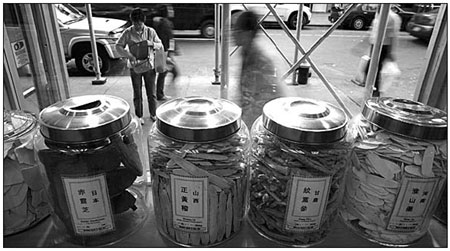Traditional Chinese medicine hopes for global approval
font-size:

Ingredients for herbal prescriptions in jars at the Kamwo herbal pharmacy in New York's Chinatown neighborhood. Chip East /Bloomberg

BEIJING - When Sun Xinsheng learned that a domestic traditional Chinese medicine maker had managed to acquire the necessary US Food and Drug Administration (FDA) certification to enable him to sell his wares in the United States, his first response was "unbelievable".
Sun is vice-chairman of the China Quality Association for Pharmaceuticals and his response is a reflection of the difficulties facing Chinese patent medicine makers seeking markets abroad.
Zhimingde International, a Beijing-based company engaged in bio-medicine production, spent nearly two years undergoing the demanding application process. Eventually, its products were registered by the FDA under the category of healthcare rather than medicines on July 20.
Under the terms of the FDA registration, Zhimingde's products cannot be sold in US drugstores as medicine or prescribed by doctors at higher prices. They have to be sold in supermarkets and drugstores as nourishments.
"The number of made-in-China traditional medicines now registered as medicine in the US and European markets is zero," said Luo Yang, head of the traditional Chinese medicine department of China Chamber of Commerce for the Import & Export of Medicines & Health Products.
FDA rules require three phases of clinical trials before new drugs receive approval to be available on the market. Last month, the Compound Danshen Dripping Pill, a herbal treatment for angina and coronary heart disease made by Beijing Tongrentang Health Pharmaceutical Co Ltd (TRT), became the first Chinese traditional drug to pass the second phase, but it will be 2013 before it can enter the US market.
Domestically, traditional Chinese medicine (TCM), focusing on remedying underlying causes rather than treating symptoms, is supported by a strong culture and consumer trust.
A recent survey of TCM use in China conducted by the Horizon Research Group found almost 90 percent of the 100,000 respondents use it. Nearly 50 percent of them said they chose TCM over Western medicine because it cost less and had fewer side-effects, according to the survey.
Last month, TRT signed a five-year contract to import high-quality ginseng from the US to cater to the increasing domestic demand for traditional herbal medicine. Yu Jun, president of the healthcare products division with TRT, said that the company will double the number of its drugstores "very soon" in China.
But still, Chinese manufacturers "have a long way to go" to branch into overseas markets, Luo said, adding that the country's export of traditional Chinese medicine largely focuses on herbal products, rather than the more value-added Chinese patent medicines.
So far, extracts, prepared slices and other herbal ingredients account for the bulk of China's traditional Chinese medicine export. The more value-added Chinese patent medicine, which consists of herbs and other ingredients, mixed and formed into pills, accounts for only a fraction.
According to Chinese customs statistics released last month, China's export value of TCM touched $910 million in the first half of this year, up 26 percent year-on-year, with plant extracts, prepared slices and other raw materials accounting for 78.8 percent of the total volume. Patent medicines took up only 12.9 percent of the total volume.
The export volume of Chinese patent medicines reached $160 million in 2009, up 30 percent from $125 million in 1996, according to customs figures.
The small increase over the 13 years would be erased if inflation and exchange rate changes were taken into account, industry experts said.
"The current growth model of Chinese traditional medicines' export is not sustainable," said Fang Shuting, head of the China Association of Traditional Chinese Medicine.
"The growth is based on massive consumption of natural resources, some of which are already on the precipice of extinction. More research and development efforts should be made to develop patent medicines," Fang said.
China's export growth is largely driven by a rise in volume rather than by added value, he said.
Fierce competition among exporters may force the prices of raw materials, which already offer thin profit margins, to drop further, according to industry analysts.
The export price of biloba extracts, for instance, was $500 a kilogram in 1995. This year it is $25 amid fierce price wars among domestic exporters.
Japan and South Korea are the two major players in the global TCM market, making up more than 80 percent of market share last year, according to a People's Daily report. In contrast, China only has a 5 percent share in the market.
However, Japan imports 75 percent of raw material of its Chinese patent medicines from China and resells them at much higher prices after processing, the report said.
Wu Zhendou, head of the international cooperation department with the State Administration of Traditional Chinese Medicine, was recently quoted by People's Daily as saying that Japan and South Korea imported at least 50,000 tons of traditional Chinese medicinal materials from China annually.
To cope with the problem, the Ministry of Health in August launched an industry-university alliance to promote TCM in the global market.
The alliance aims to introduce international standards to the domestic manufacturers of TCM to pave the way for easier registration in overseas markets.
"Registration and consumer acceptance are key for the country's traditional Chinese medicine to enter Western markets," said Luo Yang of the China Chamber of Commerce for the Import & Export of Medicines & Health Products.
She said there is an inherent prejudice against TCM in Western countries, where most patients still don't believe they are real drugs and have concerns about the use of animal parts in them.
"But if their doctors give out traditional Chinese medicines in prescriptions or they are on sale in drugstores, it is very likely that the patients will give the medicines a shot," she added.
Related articles
This article has no related articles!






